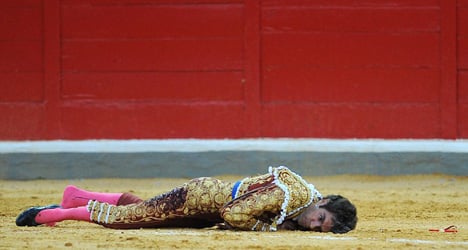Tomás, 38, is a veteran of bullfighting and widely acclaimed by fans of the controversial activity as perhaps its greatest star.
After killing one animal on Thursday afternoon, and being presented with its two severed ears as a reward, but make a mistake during his second appearance.
He entered the arena to face the previously weakened bull, then brought it to its knees before turning to receive the acclaim of the crowd.
The enraged bull did not, however, agree that the bout was over and gored Tomás from behind, tossing him around and knocking him unconscious.
He was lifted from the sand to receive medical attention but returned to finish off the exhausted bull.
.jpg)
Instead of leaving through 'la puerta grande' (the big door) to applause he was then rushed to hospital where he was diagnosed with cuts and a broken rib.
He is due to return to perform on Sunday in León. Demand for tickets is so high that ticket touts are using creative tactics to circumvent the law, such as offering them "free" with the purchase of ball point pen… for €1,500.



 Please whitelist us to continue reading.
Please whitelist us to continue reading.
Member comments